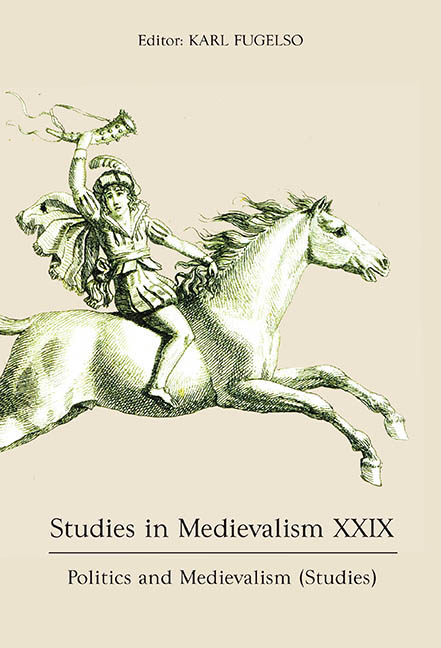Book contents
- Frontmatter
- Studies in Medievalism
- Acknowledgments
- Contents
- List of Illustrations
- Preface
- I Essays on Politics and Medievalism (Studies)
- Historical Malapropism and the Medieval Blood Libel in American Politics
- Putin’s Medieval Weapons in the War against Ukraine
- The Battle of Tours and the US Southern Border
- Medievalism, Brexit, and the Myth of Nations
- An Arthur for the Brexit Era: Joe Cornish’s The Kid Who Would be King
- II Other Responses to Medievalism
- Angle-ing for Arthur: Erasing the Welsh in Guy Ritchie’s King Arthur: Legend of the Sword
- Chasing Freyja: Rape, Immigration, and the Medieval in Alt-Right Discourse
- “Things painted on the coarse canvas”: Political Polemic in Jean-Paul Laurens’s Portrait of the Child Emperor Honorius
- Longfellow and Old English
- Archaeology and Medievalism at Julian of Norwich’s Anchorite Cell
- A Revelation of Love: Christianity, Julian of Norwich, and Medieval Pity in the Harry Potter Series
- In the Beginning Was the Word: How Medieval Text Became Fantasy Maps
- Objectivity, Impossibility, and Laughter in Doctor Who’s “Robot of Sherwood”
- Sonic Medievalism, World Building, and Cultural Identity in Fantasy Video Games
- Contributors
- Miscellaneous Endmatter
Chasing Freyja: Rape, Immigration, and the Medieval in Alt-Right Discourse
Published online by Cambridge University Press: 19 August 2020
- Frontmatter
- Studies in Medievalism
- Acknowledgments
- Contents
- List of Illustrations
- Preface
- I Essays on Politics and Medievalism (Studies)
- Historical Malapropism and the Medieval Blood Libel in American Politics
- Putin’s Medieval Weapons in the War against Ukraine
- The Battle of Tours and the US Southern Border
- Medievalism, Brexit, and the Myth of Nations
- An Arthur for the Brexit Era: Joe Cornish’s The Kid Who Would be King
- II Other Responses to Medievalism
- Angle-ing for Arthur: Erasing the Welsh in Guy Ritchie’s King Arthur: Legend of the Sword
- Chasing Freyja: Rape, Immigration, and the Medieval in Alt-Right Discourse
- “Things painted on the coarse canvas”: Political Polemic in Jean-Paul Laurens’s Portrait of the Child Emperor Honorius
- Longfellow and Old English
- Archaeology and Medievalism at Julian of Norwich’s Anchorite Cell
- A Revelation of Love: Christianity, Julian of Norwich, and Medieval Pity in the Harry Potter Series
- In the Beginning Was the Word: How Medieval Text Became Fantasy Maps
- Objectivity, Impossibility, and Laughter in Doctor Who’s “Robot of Sherwood”
- Sonic Medievalism, World Building, and Cultural Identity in Fantasy Video Games
- Contributors
- Miscellaneous Endmatter
Summary
On January 19, 2017, a meme originating from Facebook made its way onto the public website Meme. The base image is a screen capture of Lagertha, a popular female character from the History Channel historical drama Vikings, donning a ring mail shirt and riding on a white horse, with a single phrase written beside her: “Strong Heathen Women: The Cure for Islam and Christianity.” Although the original Facebook post has since been deleted, the image circulated across social media, appearing in several variations, including one, tagged “#Asatru” (a Norse neopagan religion) and “#Totally Badass” on Pinterest by user Scholar's Thoughts. This version of the meme reads: “Strong heathen woman says: Mohammed? Never heard of her.” Although many of the users sharing these images do not seem to espouse alt-right leanings, some even going as far as to tag them #feminism, the message resonates with discourse that has come to pervade alt-right and other anti-Islamic subcultures, especially those with Scandinavian traditionalist or Norse pagan undertones, over the last decade. This message posits the Nordic, often pre-Christian woman against the invading “foreign” religions or ideologies often represented by asylum seekers or other non-white immigrants to the region.
The call to protect women's rights as an excuse for Islamophobia is not a new one, found throughout so-called anti-jihadist groups including the Christian-leaning “Stop the Islamization of Denmark” (“Stop Islamiseringen af Danmark”) which claims it is “not racist to be anti-Islamic” because under Islam “women will be discriminated against.” However, far-right groups with a Norse neopagan bent often take this a step further, not only by extending Islam to include all Abrahamic (Semitic) traditions, including Christianity, but also by creating a specific image of Norse womanhood that, they claim, must be cherished and protected. Largely appropriated from the myths and sagas of the Icelandic Commonwealth period, this image emphasizes the strength and procreative power of Norse women as warriors and keepers of the homestead and imagines both the public and domestic spheres under threat from “invading” ideals foreign to Scandinavian culture. Nordic traditionalist and Norse neopagan branches of the alt-right in both Europe and around the world appropriate the medieval past to fuel modern conflict surrounding immigration and asylum seekers, characterizing Norse femininity as paradoxically strong but threatened, vital to the survival of Scandinavian culture but also in danger of being overcome.
- Type
- Chapter
- Information
- Studies in Medievalism XXIXPolitics and Medievalism (Studies), pp. 67 - 82Publisher: Boydell & BrewerPrint publication year: 2020



